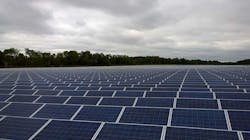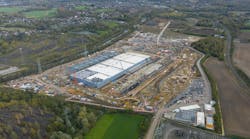Dominion Energy will add six new solar power facilities to provide dedicated renewable energy for Facebook data centers, the company said Monday. The facilities will add 350 megawatts of solar energy to support Facebook’s infrastructure in Dominion’s coverage area. The agreement was announced by Facebook CEO Mark Zuckerberg as part of the company’s recognition of Earth Day.
The new solar supply will help address the concerns raised by Greenpeace about the pace of Dominion’s renewable energy program, and whether it was keeping pace with the extraordinary growth of the data center industry in Northern Virginia.
Dominion Energy said the new projects help maintain progress towards its goal of having 3,000 megawatts (MW) of new solar and wind energy in operation or under development by 2022, as well as Facebook’s goal of supporting their global operations with 100 percent renewable energy by the end of 2020. This is Facebook’s second green energy deal in the region in 2019, as it previously worked with landlord Digital Realty to procure 80 megawatts of solar power for its wholesale data center footprint in Northern Virginia.
The solar projects will be built in Dominion Energy’s service area in Virginia and North Carolina and will gradually come operational by mid-2020. The new projects include:
- 20 MW Montross Solar in Westmoreland County, Va. (completed)
- 20 MW Gloucester Solar in Gloucester, Va. (completed)
- 80 MW Grasshopper Solar in Mecklenburg, Va.
- 75 MW Chestnut Solar in Halifax County, N.C.
- 75 MW Pecan Solar in Northampton County, N.C. (completed)
- 80 MW Gutenberg Solar in Northampton County, N.C.
Dominion Energy developed Montross Solar, and the other projects have or will be acquired from EDF Renewables, Inc., BayWa r.e. Solar Projects LLC, and Strata Solar.
These six facilities are in addition to the two previously announced solar projects in Surry County, Va., which total 240 MW and were recently approved by the Virginia State Corporation Commission (including the energy arranged through Digital Realty).
Leadership From Facebook
In 2018 Facebook announced power purchase agreements for 1,850 megawatts of renewable energy in 2018, helping corporate buyers set a new single-year record for green power procurement, according to the Rocky Mountain Institute.
A solar power array outside the Facebook data center in Prineville, Oregon. (Photo: Rich Miller)
“Facebook has consistently supported the development of green energy around the world, and their corporate sustainability goals are a driving force in the expansion of renewable energy,” said Keith Windle, Dominion Energy’s vice president of Business Development. “We are proud to be a trusted energy partner as we actively grow the market for clean energy.”
“We are thrilled to be able to partner with Dominion Energy to support our operations with new renewable energy resources and bring additional investment to the region,” said Bobby Hollis, head of Global Energy and Site Selection at Facebook. “We look forward to continuing to partner together to further grow the clean energy market and encourage others to power their operations with renewable resources.”
Today, Dominion Energy has more than 30 solar facilities totaling 884 MW of solar generation operational or under development in Virginia.
Greenpeace’s February report titled “Clicking Clean: The Dirty Energy Powering Data Center Alley” uses public data about generator permits and PUE data to estimate the cloud computing sector’s use of electricity in Northern Virginia. The group contrasts the energy used by cloud data centers with the amount of renewable energy being provisioned by the industry.
Cloud computing has emerged as a surprising force in the shift to renewable energy to power the Internet economy, with Google, Facebook, Amazon, Microsoft and Apple making public commitments to sourcing renewable energy for their cloud data centers. These companies have used power purchase agreements (PPAs) to buy wind and solar energy to offset their data center energy use.
In Virginia, Dominion Energy sources the majority of its energy from natural gas or nuclear plants. Northern Virginia accounted for 55 percent of all new data center space in 2018, with more than 270 megawatts of capacity leased. Meanwhile, Dominion Energy sources just 5 percent of its electricity from renewable sources, with most of its energy coming from nuclear power (33.8%), natural gas (33.6%) and coal (26.5%).
Greenpeace says this is a major barrier to creating a “clean cloud” supported by renewable energy.
For additional insights into the use of renewable energy in data centers, see these stories:
About the Author



